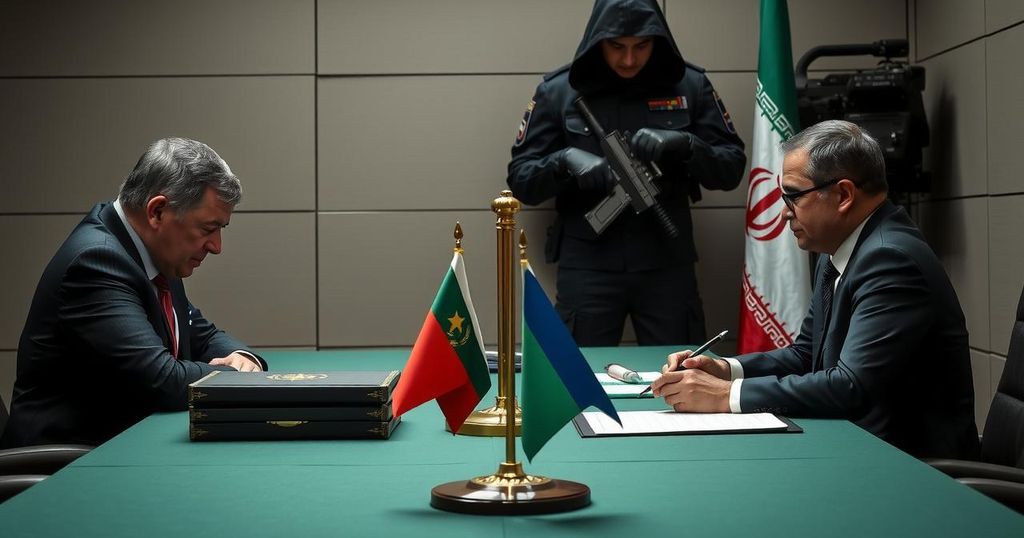Iran is demanding a prisoner swap with Italy, linking the release of detained journalist Cecilia Sala to the freedom of Iranian national Mohammad Abedini, arrested at the request of the U.S. Sala has been held in solitary confinement under unresolved charges, leading to heightened tensions between Italy and Iran. Italian officials are navigating a sensitive negotiation process while increasing concerns over Sala’s treatment in detention.
Italy is currently engaged in delicate diplomatic negotiations with Iran regarding the case of Cecilia Sala, an Italian journalist detained in Iran. Tehran has indicated that the release of Sala, who has been in solitary confinement since her arrest last month, hinges on Italy’s acquiescence to release Mohammad Abedini Najafabadi. Abedini was apprehended at the request of the United States for his involvement in a drone attack that resulted in the deaths of three U.S. soldiers. A source familiar with the discussions revealed that Iran conveyed its demand through the Italian ambassador in Tehran.
Sala’s family has expressed deep concern over her conditions in detention, noting an absence of formal charges against her, which underscores the arbitrary nature of her confinement. The Italian Foreign Ministry has escalated its calls for an immediate resolution, emphasizing the urgency of her release. Meanwhile, Iranian officials have reportedly withheld details of the accusations against Sala, possibly to maintain leverage over her situation.
The complexity of Sala’s detention is exacerbated by the simultaneous legal proceedings involving Abedini in Italy, culminating in his first court appearance shortly before Sala’s arrest. While Italy’s officials are cautious in public statements to avoid exacerbating tensions, they are reportedly considering all options to secure Sala’s release. The U.S. has also taken a firm stance, calling for the immediate release of all individuals unjustly detained in Iran.
The Italian government is faced with a challenging dilemma: how to balance diplomatic relations with Tehran while ensuring the safety of its citizen. As negotiations continue behind the scenes, the Italian government’s ability to navigate this intricate political landscape is under scrutiny. Despite official efforts, Sala’s family remains dissatisfied with the government’s handling of the situation, insisting on clarity and action regarding her continued detention.
Amid these developments, the potential for a prisoner swap between Italy and Iran raises questions about the future of international diplomacy affecting the lives of individuals caught in such geopolitical conflicts.
The situation revolves around the arrest of Cecilia Sala, a 29-year-old Italian journalist, who was detained in Iran under dubious circumstances. Her detention is believed to be intertwined with the case of Mohammad Abedini Najafabadi, an Iranian national arrested in Italy at the behest of the United States. The U.S. claims Abedini is connected to a drone attack that killed American soldiers, which adds a layer of complexity to the bilateral relations between Italy and Iran. The absence of formal charges against Sala intensifies concerns regarding her welfare and the legitimacy of her detention. This scenario reflects broader issues of political leverage and the strategy of prisoner exchanges in international relations, particularly involving Iran which has a noted history of utilizing such tactics in negotiations. Italian officials have exercised caution in their public communications to avoid provoking Iranian authorities, emphasizing the sensitivity of the situation while maintaining a commitment to secure Sala’s release. Furthermore, the U.S. has publicly reiterated its position on the unjust nature of Sala’s detention, pressing for her immediate release without conditions. The Italian government is under pressure to balance national interests and diplomatic delicacy amid mounting public concern for Sala’s safety and well-being.
In summary, the case of Cecilia Sala illustrates the complexities of international diplomacy, particularly regarding the interplay between justice, security, and human rights. The Italian government is navigating a precarious path as it seeks to secure the release of its detained journalist while balancing relationships with both Iran and the United States. The lack of formal charges against Sala raises serious questions about her condition and the nature of her detention, while the entangled legal proceedings involving Abedini add further layers of difficulty. As the situation evolves, it remains critical for the Italian government to take measured actions that ensure both domestic and international considerations are addressed, ultimately striving for a resolution that prioritizes Sala’s safe return.
Original Source: www.iranintl.com






